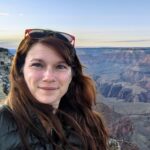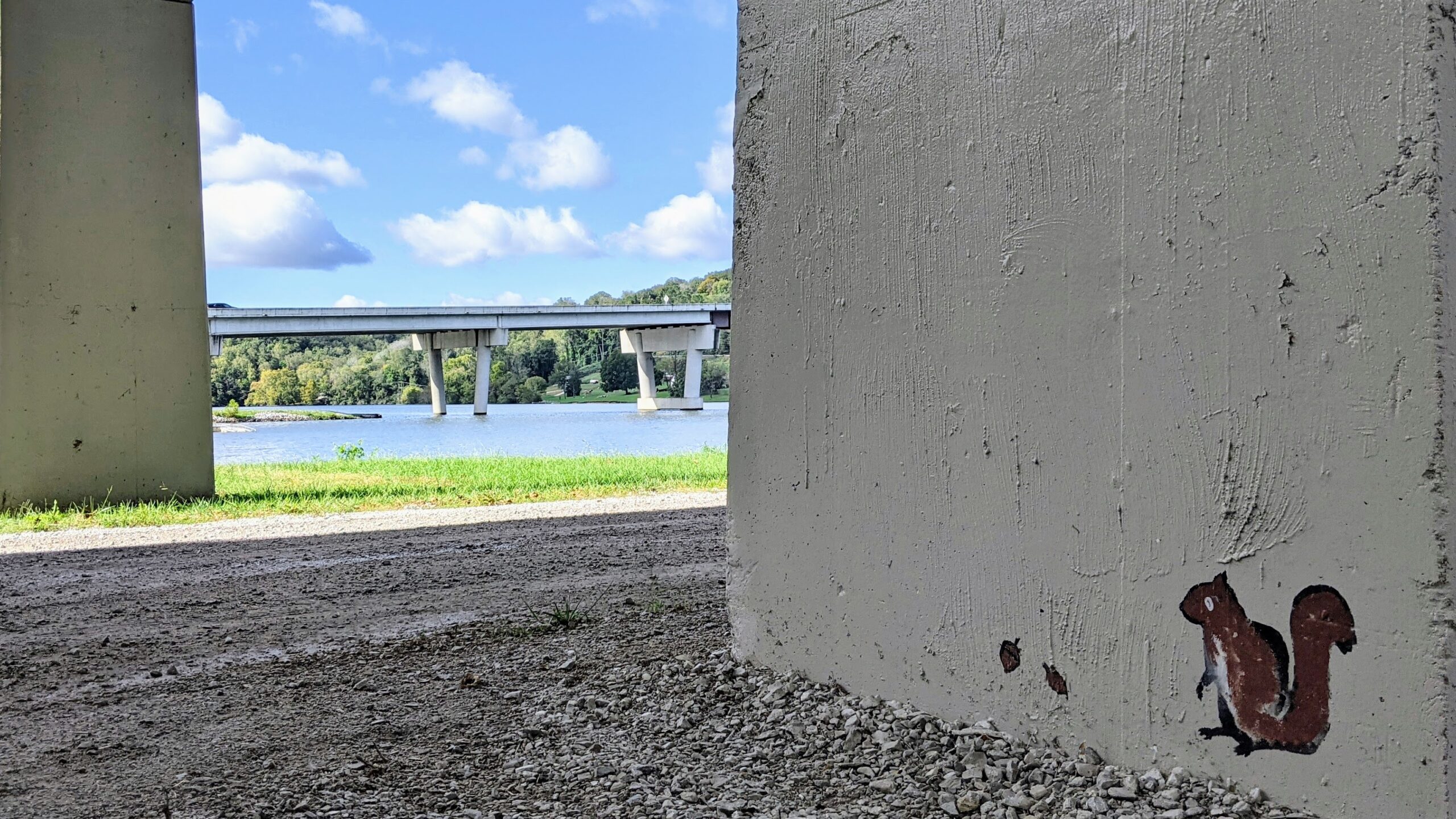I’m drinking hot coffee on a heat wave morning but a chill still runs through my body when I read the news—the United Nations has officially declared access to a sustainable environment to be a universal human right. Even more astonishingly, the three main existential threats addressed by the recent resolution include not only climate change and pollution but also loss of biodiversity. Humans have finally, globally acknowledged that the lives of other species are unequivocally interwoven with our own, and for the first time in a long time I can’t help but feel a little glimmer of dusty hope rise within my heart—because I’ve seen the impossible become possible before.
Not too long ago, during the days when the people stayed home and wildlife roamed the open spaces again, I almost ran over a bald eagle. I came around a bend and saw, just in time, the massive bird perched on the remains of a roadkill boar who must not have noticed that the humans were out again. As I slammed on the breaks in panic, the eagle merely lifted itself into air with such little effort that I couldn’t help but stare in awe, even as I braced for impact—leaning forward, my jaw hanging open, watching its toenails nearly graze the windshield while I screeched to a stop just below its enormous wings. Then I sat on the side of the road for a long time in stunned silence collecting myself. I’d just seen an eagle’s toenails so closely that if not for the glass between us, I could have reached out and touched them. How could I possibly just drive on as if such a thing were a normal, everyday occurrence?
Once upon a time, it wasn’t normal at all. As a child in the eighties, I read with sadness that I’d likely never see my own country’s national bird with my own eyes. Despite the fact that they had roamed the skies for over a million years, only 400 of these majestic beasts remained by the time conservationists acted to save them from extinction in the early 1960s. Today, recent studies show over 300,000 individuals once again roam the skies of 48 states. The eight-year-old in me clings to this fact like a life raft. I’m a believer of science and cause and effect, but I’ve also seen miracles happen and I know that oftentimes adults will assume something isn’t possible just because they’re too tired or lazy or jaded to care enough to think about how it could be possible.
I once saw a bald eagle’s toenails. And as I watched it lean its wings on air and pull itself into the sky as casually as someone lifting themselves from a chair, I witnessed the embodiment of grace both as the English dictionary defines it—“to move elegantly” or “to honor someone with one’s presence”—and as Christians define it—“a spontaneous gift from God, generous, free and totally unexpected and undeserved.”
The ungracefulness of humans is staggering in comparison. In a very short time, we have allowed the gifts of millennia to be squandered by a very small percentage of people—ancient forests are burning alive and taking our air along with them, plants and minerals are patented for profit while the sick suffer and go hungry for lack of money, the same water once ingested by our ancestors is now contaminated with man-made toxins and the poisons that come from wrenching the earth inside out, and an unfathomable number of species are going extinct before we have a chance to understand their impact upon this delicate web of life. How can we possibly try to move back at this late juncture to our place in that web, and dare to call ourselves kin with the earth’s beings again? No resolution alone is going to do it, that’s for certain, no matter what body of politicians or celebrities declare it. Change cannot possibly come fast enough to save us all.
Despite this cold fact, however, I’ve also seen in my short lifetime that change can still come faster than we think—when we put our minds to it. Once, as I walked along a cliffside peninsula jutting out into the Pacific ocean, a humpback whale suddenly breached from the depths to float briefly in the air only a hundred feet from me. Grace was the only word that came to mind then too, as I watched a being larger and lumpier than any I’d ever seen before leap from water into sky and back again as if they were one and the same. It was my first sighting of a whale and so close and unexpected that my response was to pee myself while I giggled with wild abandon in surprise, fear, and awe at what I’d just witnessed. Never in my life had I dared hope to see one so close in its natural environment.
Before commercial whaling was finally banned in the 1960s, only 5,000 humpbacks remained in the entire world. I’d also read about them as a child—how they will sing continuously in unison for hours, only pausing to breathe; how they live to be 90 years old and travel as much as 9,000 miles each year; how they had been swimming the waters of the earth for somewhere between seven and ten million years before humanity nearly annihilated them in less than three hundred. Today, despite all odds, and in only fifty years, their numbers have nearly returned to what they were before that era of mass slaughter.
I know that so many others have not been as lucky. While more than fifty of the native species placed on the U.S. Endangered Species List have since been removed after their populations rebounded, another twenty were recently declared to be extinct. Another 1,000 are threatened or endangered. That’s just today. In the United States. What is yet to come is far heavier.
Some have also defined grace as the ‘silver lining’ of life, but I refuse to use that phrase in the presence of such massive suffering, greed and wastefulness. Still, it is true that grace can be witnessed even in the darkest hours. Ram Dass wrote about “fierce grace,” an opening of the heart and spirit that comes when we don’t know what to do or where to turn and instead just wrap ourselves in bottomless, painful love and grief for a while, molting into someone new whether we want to or not.
I didn’t need to suffer the loss of the wild things to know that I appreciate them, but it is certainly true that in their growing absence we finally came face to face with our own role within it all—both our limitations and our abilities. We find that whether we want to or not, we are being changed by the lack of their presence—into what remains to be seen, determined by what we do with this insight.
And so even as I despair over those already lost and soon-to-be-lost, I also can’t forget the time I canoed with sea otters in the Pacific Northwest—even though sea otters had once been declared nearly as mythical as mermaids or selkies. That day, I’d misjudged the timing of the tide and found myself alternately scooting along by dragging my oars through the sand or pulling the canoe rapidly through miles of sparkling, shallow water until my feet froze and I had to hop back in again. Then I’d give up and sit in my human stupidity for a while, growing seasick in a foot of water as the sun sparkled off the crossing currents, and watch the two ocean-bears who followed me for hours.
At one point they floated right alongside the canoe to let me see for sure who they were, or perhaps to get a closer look for themselves at the clumsy land-creature trying to walk on water. As we watched each other with a mix of curiosity and trepidation, I wondered if the ancient stories of half-human creatures first came from reports of long-lost beings that once went extinct—or from the desperate hopes of mankind as we first began to want to become anything but human.
Hundreds of thousands of sea otters once swam along the northern coasts of the Pacific Ocean for millions of years until the mid-18th century, when a booming fur trade rose overnight—and collapsed less than two hundred years later when only a few thousand remained at most. Still, despite the extreme improbability of their survival even after being reintroduced and declared endangered, on that day I found myself floating in the presence of their progeny along the subtle cerulean crack between sky and water, as if it were a completely normal occurrence for a human and a sea otter to share space together without disrupting the balance.
In so many ways, I am not a graceful creature. I nearly run over eagles, tumble into whales, and blunder over the earth like I did in the canoe that day, awkwardly seeking to know as much of it as possible without messing it up in my path. I try to honor it with my presence but usually end up learning harsh lessons instead. I get stuck in the crossing currents, confused by this intertwined inheritance of fear/destruction and the unexpected/undeserved gifts that still exist—and often find myself unsure as to how to feel, how to react, and how to continue moving along in a world that I’ve been told my whole life is dying but which is still very much trying to stay alive.
But the wild things teach me that grace is not always what we would define as beautiful. It can also be as feral and unrestrained as a (once endangered) Grizzly Bear defending her cubs. Those sea otters could have very quickly and gracefully eaten my face if I’d threatened them. And sometimes insight hurts more than we can think we can possibly endure. But wild grace has no requirements but one one: be who you are, both small and significant, in this great tangled web of mystery.
I read about my own kind too as a child—how we are a migratory species that needs community to survive, how we existed upon this earth for hundreds of thousands of years without commercial exploitation of our resources, how by the time we began to realize what we had done, our species and so many others were dying en masse around the globe due to lack of food, water and balance. How eventually, we started going wild again—standing up to our own so that others could survive, daring to try even when all seemed lost.
Today, I’ve watched with my own eyes as once endangered beings move between the elements like their ancestors once did—because enough humans embraced both our limits and abilities in the name of balance and life. The eight-year-old in me clings to this fact like a life raft as I float along this new horizon of uncertainty—in awe at the knowledge of what we’ve destroyed, what we’ve saved, and what is possible when human beings act with grace.

Jess Lee
JESS LEEis an environmental & community advocate drawn to borders, ecotones, and the shadows between the lines. She was raised in the forests of Appalachia and lived for many years in Mexico, Hawaii and the Pacific Northwest. Her short stories and essays have been published in Cutthroat, Burnt Pine, The Humanist and Z Magazine.

